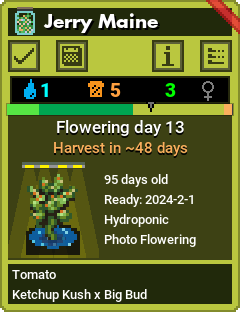Grow
In Bloom Wizard the term Grow is used for each of your unique growing projects.
You can create a Grow for a project you are going to start in the future, have already started, or have already completed. A Grow can have 1 plant, or more than 100 plants, but should generally be tracking the same type of plant.
Examples of a Grow
- A bed of many beefsteak tomato plants
- One pepper plant
- Several cannabis plants
- A small bunch of lavender
All the details/traits/statistics/etc regarding a Grow are called Attributes in Bloom Wizard.
When adding a Grow you will have several pages of attributes you can configure. Some attributes are automatically calculated.
If a Grow is Active then it will be represented by a Grow Card on the Dashboard.

Methods for Adding a Grow
- Add a Grow function on primary toolbar
- Copy an existing Grow
- Clone an existing Grow
- Import/copy data
Grow Stages
Bloom Wizard breaks the growing cycle out into 5 stages. No stage is required, and you can use the stages in whatever way works best for you:
- Starting: Encompasses everything (germination, seedling, rooting) up until Vegetative growth.
- Vegetative: This stage starts when a plant is ready for full light and/or outdoor elements.
- Flowering: This stage starts when a plant starts to flower/fruit.
- Drying: A stage typically used by herbs to remove moisture.
- Curing: A final stage typically used by herbs to remove moisture and improve flavor.
Grow Specifics & Details
- Can be named almost anything.
- Represented by a Grow Card on the main Dashboard.
- 3 states: Active, Archived, or in Cold-Storage.
- It gets a unique ID [UID]. This is used to identify the Grow and is used in its filename: grow_[UID].csv
- Grow files are saved in CSV format. These files can be accessed/shared/backed up/edited with common tools.
- The Grow file contains all data about the Grow including Attributes, Tasks, and Readings.
- It gets a serial number, starting at 1 and counting up for each Grow added.